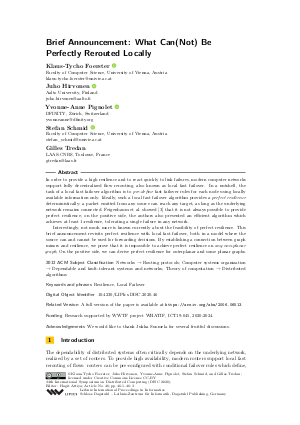Brief Announcement: What Can(Not) Be Perfectly Rerouted Locally
Authors
Klaus-Tycho Foerster  ,
Juho Hirvonen
,
Juho Hirvonen  ,
Yvonne-Anne Pignolet
,
Yvonne-Anne Pignolet  ,
Stefan Schmid
,
Stefan Schmid  ,
Gilles Tredan
,
Gilles Tredan
-
Part of:
Volume:
34th International Symposium on Distributed Computing (DISC 2020)
Part of: Series: Leibniz International Proceedings in Informatics (LIPIcs)
Part of: Conference: International Symposium on Distributed Computing (DISC) - License:
 Creative Commons Attribution 3.0 Unported license
Creative Commons Attribution 3.0 Unported license
- Publication Date: 2020-10-07
File

PDF
LIPIcs.DISC.2020.46.pdf
- Filesize: 0.56 MB
- 3 pages
Document Identifiers
Related Versions
-
A full version of the paper is available at https://arxiv.org/abs/2006.06513.
Subject Classification
ACM Subject Classification
- Networks → Routing protocols
- Computer systems organization → Dependable and fault-tolerant systems and networks
- Theory of computation → Distributed algorithms
Keywords
- Resilience
- Local Failover
Metrics
- Access Statistics
-
Total Accesses (updated on a weekly basis)
0Document
0Metadata
Abstract
In order to provide a high resilience and to react quickly to link failures, modern computer networks support fully decentralized flow rerouting, also known as local fast failover. In a nutshell, the task of a local fast failover algorithm is to pre-define fast failover rules for each node using locally available information only. Ideally, such a local fast failover algorithm provides a perfect resilience deterministically: a packet emitted from any source can reach any target, as long as the underlying network remains connected. Feigenbaum et al. showed [Feigenbaum and others, 2012] that it is not always possible to provide perfect resilience; on the positive side, the authors also presented an efficient algorithm which achieves at least 1-resilience, tolerating a single failure in any network. Interestingly, not much more is known currently about the feasibility of perfect resilience. This brief announcement revisits perfect resilience with local fast failover, both in a model where the source can and cannot be used for forwarding decisions. By establishing a connection between graph minors and resilience, we prove that it is impossible to achieve perfect resilience on any non-planar graph; On the positive side, we can derive perfect resilience for outerplanar and some planar graphs.
Cite As Get BibTex
Klaus-Tycho Foerster, Juho Hirvonen, Yvonne-Anne Pignolet, Stefan Schmid, and Gilles Tredan. Brief Announcement: What Can(Not) Be Perfectly Rerouted Locally. In 34th International Symposium on Distributed Computing (DISC 2020). Leibniz International Proceedings in Informatics (LIPIcs), Volume 179, pp. 46:1-46:3, Schloss Dagstuhl – Leibniz-Zentrum für Informatik (2020)
https://doi.org/10.4230/LIPIcs.DISC.2020.46
BibTex
@InProceedings{foerster_et_al:LIPIcs.DISC.2020.46,
author = {Foerster, Klaus-Tycho and Hirvonen, Juho and Pignolet, Yvonne-Anne and Schmid, Stefan and Tredan, Gilles},
title = {{Brief Announcement: What Can(Not) Be Perfectly Rerouted Locally}},
booktitle = {34th International Symposium on Distributed Computing (DISC 2020)},
pages = {46:1--46:3},
series = {Leibniz International Proceedings in Informatics (LIPIcs)},
ISBN = {978-3-95977-168-9},
ISSN = {1868-8969},
year = {2020},
volume = {179},
editor = {Attiya, Hagit},
publisher = {Schloss Dagstuhl -- Leibniz-Zentrum f{\"u}r Informatik},
address = {Dagstuhl, Germany},
URL = {https://drops.dagstuhl.de/entities/document/10.4230/LIPIcs.DISC.2020.46},
URN = {urn:nbn:de:0030-drops-131244},
doi = {10.4230/LIPIcs.DISC.2020.46},
annote = {Keywords: Resilience, Local Failover}
}
Author Details
Funding
Research supported by WWTF project WHATIF, ICT19-045, 2020-2024.
Acknowledgements
We would like to thank Jukka Suomela for several fruitful discussions.
References
-
J. A. Bondy and U. S. R. Murty. Graph Theory with Applications. Elsevier, New York, 1976.

-
M. Chiesa et al. On the resiliency of static forwarding tables. Trans. Netw., 25(2), 2017.

-
J. Feigenbaum et al. BA: On the resilience of routing tables. In Proc. PODC, 2012.

- K.-T. Foerster, J. Hirvonen, Y.-A. Pignolet, S. Schmid, and G. Trédan. On the feasibility of perfect resilience with local fast failover. CoRR, 2020. URL: http://arxiv.org/abs/2006.06513.
